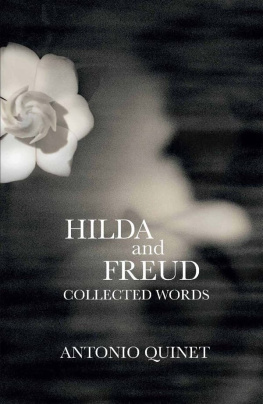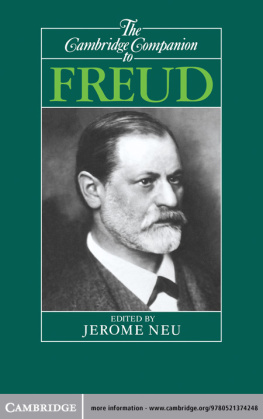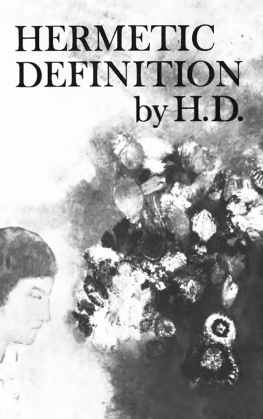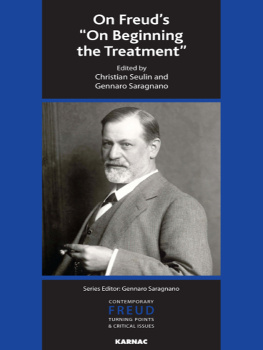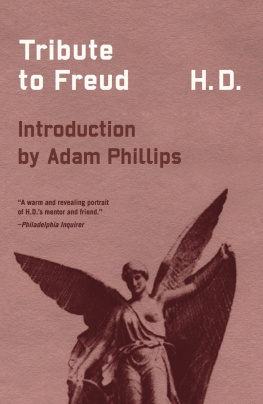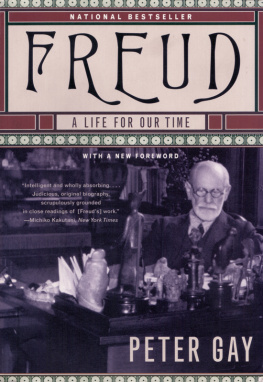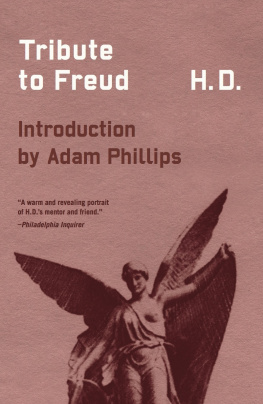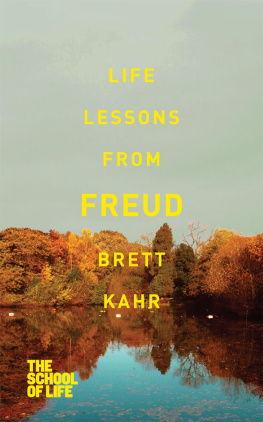MAKING OFF
Sources:
Tribute to Freud by H. D. (TF)Writing on the wall (WW)Advent (Ad), A New Directions Book, Foreword by Norman Holmes Pearson, New York, NY, 1956, 1974, 1984.
Analyzing Freud (AF)Letters of H. D., Bryher and Their Circle, Edited by Susan Stanford Friedman, A New Direction Books, New York, NY, 2002.
H. D.Collected Poems 19121944 (CP), Edited by Louis L. Martz, New Directions Book, 1983, ninth printing.
Notes on Thought and Vision (NTV), by H. D. Edited by Lawrence Ferlinghetti and Nancy J. Peters, City Lights Books, San Francisco, 1982.
FreudA Life for Our Time, by Peter Gay, W.W. Norton & Company? New YorkLondon, 1988.
Sigmund FreudLife and WorkLast Phase (19191939) by Ernes Jones, Hogarth Press, London, 1980.
The drama of this play is inspired, quoted from or based on the following references, in the order of their appearance:
Scene 1:
WW: chapter 63; chap. 68; chap. 48 (TF); Letter from Freud to H. D, Dec 18th, 1932 (TF); Letter from H. D. to Bryher, August 30, 1934 (AF); Poem The Master (CP); Letter from H. D. to Dr Havelock Ellis, Dec 27th, 1932 (AF); Letter from H. D. to Bryher, Jan 3rd, 1933 (AF); Letter from H. D. to Havelock Ellis Jan 26th, 1933 (AF); Letter From Freud to H. D. Feb 4th, 1933 (AF); Letter from H. D. to Bryher, with note to Kenneth Maspherson, Feb 28th, 1933 (AF); Letter from H. D. to Bryher March 1st, 1933 (AF).
Scene 2:
This is a sketch of H. D.'s biography collected from multiple sources refered to above.
Scene 3:
WW: chap. 28 (TF); Ad: chap 1 (TF); Poem Fragment sixty-eight and Poem Envy (CP); WW: chap. 15; chap. 18; chap. 19 (TF); Ad: chap. 2 (TF); WW: chap. 21; Letter from H. D. to Havelock Ellis, Jan 17th, 1933 (AF); Ad: chap. 4 (TF); NTV.
Scene 4:
H. D. assisted with the launch of film The Blue Angel when she was in Vienna; Letter from Freud to H. D., March 5th, 1934 (TF); WW: chap. 43; chap. 44; chap. 118 (TF).
Scene 5:
Session 1
WW: chap 7476 (TF); Letter from H. D. to Bryher and Kenneth Macpherson, March 1st, 1933 (AF).
Session 2
WW: chap. 10 and 11 (TF).
Session 3
Ad: chap. 11(TF).
Session 4
Letter from H. D. to Bryher, March 23th, 1933 (AF).
Session 5
Letter from H. D. to Bryher, March 10th, 1933 (AF).
Session 6
Ad: chap. 5; chap. 15; chap 5, chap. 20 (TF).
Session 7
WW: chap 32; chap 3641; chap. 32 (TF); Ad: chap. 7; chap. 15 (TF); Letter from H. D. to Bryher, March 19th, 1933 (AF).
Session 8
WW: Chap. 4547 (TF).
Session 9
WW: chap 6465 (TF); poem: The Master (CP).
Session 10
WW: chap. 4041 (TF).
Session 11
WW: chap. 5152 (TF); WW; chap. 67 (TF).
Session 12
WW: chap. 69; chap 85 (TF); Letter from Freud to H. D. May, 24th, 1936 (TF); H. D.'s Hirslanden Notebooks op. cit AF, p. xxxvii.
H. D. AT THE FREUD MUSEUM
Dawn Kemp
T wenty Maresfield Gardens, Hampstead, North London, the last home of Sigmund Freud is a place of pilgrimage. Not just for the psychoanalytic cognoscenti but for artists, writers, filmmakers, cultural aficionados of every kind. It is the archaeological site of Freud's material remains, a physical palimpsest of the development of his ideas: his library; the original psychoanalytic couch; his collection of over 2,000 figures from antiquity, fecund with stories: Osiris the god of the afterlife, the questioner; the Sphinx, Oedipus great tester; Athena the virgin goddess of wisdom and war and Thoth the god of wisdom, inventor of writing are there among the hundreds gathered in cabinets; on recessed shelves; on table and desk tops, mute witnesses to the revelations of the fragile souls who came to Freud for greater understanding of themselves.
Maresfield Gardens, a leafy street in an affluent London suburb, is an unlikely place to find the genius loci of psychoanalysis and the objects that informed the most influential cultural theories of the modern world, yet behind the doors of number twenty that is exactly what exists. On the 12th November, 2013, there could have been no more fitting location for the world premiere of Hilda and Freud: Collected Words, a play that captures the essence of one of Freud's most fascinating friendships.

